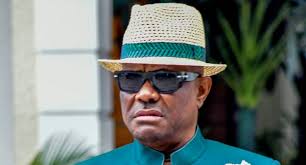
Nyesom Wike Faces Extradition And Prosecution Push from Nigerians Abroad
On September 28, 2025, GCSDN filed a formal petition in Florida, alleging that Minister Nyesom Wike secretly funneled illicit Nigerian funds into multimillion-dollar U.S. real estate and demanding his immediate extradition.
FLORIDA, U.S.A. – SEPTEMBER 27, 2025
Nigerians in the diaspora have formally petitioned U.S. authorities to investigate and extradite Nigeria’s Federal Capital Territory (FCT) Minister, Nyesom Ezenwo Wike, over allegations of fraud and money laundering.
The petition, addressed to Florida Attorney General James Uthmeier and dated 28 September 2025, was signed by Comrade Frederick Odorige, Global Coordinator of the Global Coalition for Security and Democracy in Nigeria (GCSDN). It accuses Wike of using the United States as “a safe haven for the laundering of stolen money from Nigeria,” detailing a political career spanning from local government chairman in 1999 to his current cabinet post.
The letter lists three Florida properties allegedly tied to Wike and his family:
-
113 Spring Creek Lane – a mansion reportedly purchased in March 2025 for $2 million.
-
209 Hertherwood Court – acquired in July 2021 for $459,157, allegedly transferred to his son, Joaquin.
- 208 Hertherwood Court – bought in September 2023 for $465,000, allegedly transferred to his daughter, Jazmyne.
The petition supposed Wike, his wife Justice Eberechi Suzette Nyesom-Wike (an Appeal Court judge), and their three children are linked to these properties and may hold additional hidden assets in the U.S. through proxies.
Odorige argues that the couple’s official earnings could not legitimately fund such acquisitions and alleges the funds were “proceeds of fraud… from the pilfering and criminal manipulation of budgets, inflated project costs, and direct withdrawal of public resources.” He notes that Wike’s failure to declare these U.S. properties violates Nigeria’s Code of Conduct Bureau (CCB) asset-declaration rules.
The petition highlights Nigeria’s economic hardship, citing World Bank projections of rising poverty and describing Wike’s alleged actions as contributing to “artificial poverty and economic hardship that is being suffered by Nigerians presently.” It urges U.S. authorities to act under Chapters 655 and 896 of the Florida Statutes, which govern money laundering.
Copies of the petition were also sent to the FBI Headquarters in Washington, D.C.
Sowore’s Parallel Petition
Separately, Nigerian activist Omoyele Sowore previously petitioned Florida officials, asking for the seizure and forfeiture of the same properties, alleging they were purchased with laundered funds and transferred to Wike’s children via quitclaim deeds to obscure ownership.
The Florida Attorney General’s Office and the U.S. Department of Justice have not publicly commented on either petition. Wike has not issued a formal response to these specific allegations, though he has denied wrongdoing in earlier media interviews.
If U.S. authorities find sufficient cause, the petitions could trigger investigations and potential asset-forfeiture proceedings under American anti-money-laundering laws, as well as an extradition request to the Nigerian government.